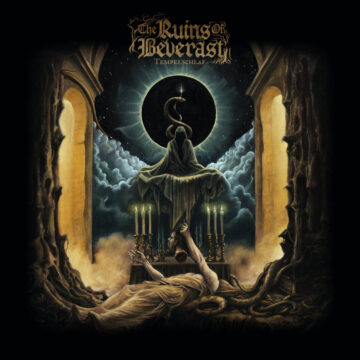Review: Mother of Millions – Magna Mater

Style: progressive metal, alternative metal (mixed vocals, majority clean)
Recommended for fans of: Leprous, Kingcrow, Katatonia
Country: Greece
Release date: 4 October, 2024
How can you break out of the patterns and routines which lock you in place? How can you look at what’s happened before and learn the right lessons to change the outcome when you try again? In creative pursuits, as in the rest of one’s life, it’s easy to get stuck in a rut that leads you down the same mental paths time after time. Human nature drives us to follow habits, to embrace the status quo. It’s only by taking a step back and re-evaluating your goals and values that these patterns can be broken, otherwise the same failings and stagnation can only continue. Although this sentiment is much more timely now compared to when Magna Mater actually released last month, it feels fitting for the year 2024 as a whole that Mother of Millions has presented us with another release that largely follows in the footsteps—and particularly the shortcomings—of what came before it.
The guitars are deeper and heftier, and the vocals have matured to greater heights in their strength, but there is little to be found within Magna Mater that wasn’t already covered in 2017’s Sigma or done better in 2019’s Artifacts. The opening track “Inside” transitions quickly from its spacey beginning into the band’s meaty signature combo of guitar and synth. This is the blueprint for the majority of the album: each track’s mood is mostly defined by the vocals, with modulations in tone or timbre offering contrast between somber and energetic productions from one song to the next, but the constant undercurrent is the rhythm section, steadily plodding along in the background but offering little distinction to any track compared to the others. Because of this, the title track stands out as the most memorable (although not the best) of the early tracks due to Antonia Mavronikola’s unique guest vocals which offer ethereal, mysterious contrast to primary singer George Prokopiou’s edgier and more powerful performance. However, even this aesthetically unique song remains largely mired in the same indistinct instrumentals, with little unique appeal to pick out aside from the vocal performances.
Mother of Millions’s music has always felt incredibly emotional (in large part thanks to Prokopiou’s singing), even when the rest of the ensemble can’t quite keep pace with the impact of his fathomless voice. Magna Mater deepens the intensity of that primary performance, but the band’s expressive capabilities as a whole still lag behind their ambition. Although the backing rhythm parts of each track do an adequate job of supporting the emotion of the vocals, they rarely combine in unique or memorable ways that create a moment greater than the sum of the recorded musical notes; this is quite a letdown compared to their prior release, Artifacts, which showed much more variety in the instrumental parts and better used the harmony of vocal and instrumental parts to produce an array of different personalities and meanings for its songs. In many ways it seems Mother of Millions might benefit from a more post-rock-esque style to accompany Prokopiou’s performance; in moments like the first minute of “Irae,” where the instrumentals fade into a passive background of keyboard-led soundscapes, his singing—finally freed of petty distractions—comfortably outshines anything that the guitar, bass, or drums put forward in the preceding seven tracks.
Funnily enough, it’s the closing tracks which give the most substantial glimpse into Mother of Millions’s potential for revolution, waving goodbye with a cheeky wink and just a suggestion of the innovation the earlier songs could have achieved. The aforementioned first half of “Irae” builds its own unique atmosphere to support gentle vocals with equally gentle piano and drums, while the second half puts me in mind of Leprous (from the Pitfalls era and beyond) with its impressive, climactic buildup; perhaps Mother of Millions could learn some key lessons from their equally vocalist-focused peer. “Irae” puts Prokopiou through a set of exercises beyond anything else to be found in Magna Mater, beginning with his trademark soft rock sweetness but ending with hard-edged, almost hardcore-punk cries that leverage his surprisingly harsh tones combined with driving, unrelenting rhythms to produce the best and most emotional moments from the album by far. Afterwards, “Space” is appropriately one of the few songs to offer space for Prokopiou’s commanding vocals to take on the leading role they were meant for, still dominant despite the softer tone of this particular song, a reminder of the band’s core musical strength but also how underrepresented it has been throughout Magna Mater.
For all the great vocal work and emotional content which runs throughout the album, Magna Mater makes little effort to take steps forward or in any other direction. Content to settle into their well worn groove, Mother of Millions play to their core strength in George Prokopiou’s singing, but fail to advance their instrumental accompaniment in ways that could support him even better. While the closing tracks “Irae” and “Space” show a flash of inspiration and novelty, the rest don’t offer any great contrast with each other or with the band’s past works. May we all learn this lesson from Magna Mater’s shortcomings: the ability to move forward, to enact real change, starts with re-evaluating the choices and patterns that brought us to where we are now, and then taking bold steps to break out of habits and move in a new direction.
Recommended tracks: Inside, Feral, Irae, Space
You may also like: Haven of Echoes, Mantra, Riviẽre, In the Silence, Traverser
Final verdict: 5/10
Related links: Bandcamp | Spotify | Official Website | YouTube | Facebook | Instagram
Label: ViciSolum – Bandcamp | Facebook | Official Website
Mother of Millions is:
– George Prokopiou (vocals)
– Kostas Konstantinidis (guitars)
– Panos Priftis (bass)
– George Boukaouris (drums, keyboards)
With guest:
– Antonia Mavronikola (additional vocals, “Magna Mater”)



1 Comment
Review: Capitan - Facing Currents - The Progressive Subway · May 24, 2025 at 3:36 PM
[…] tracks: Immerse Pt. II, A Pale Blue LightYou may also like: Riviẽre, Múr, Mother of Millions, SgàileFinal verdict: […]